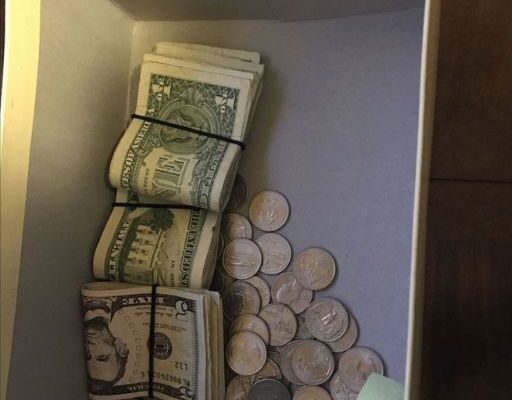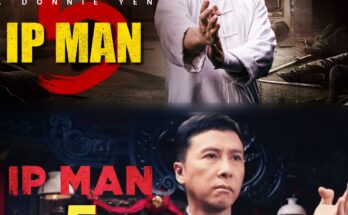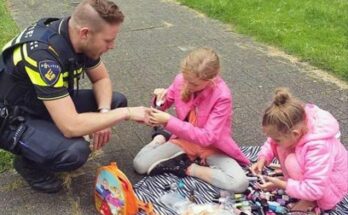You believe you know your child; then one day you discover something that completely stuns you. When I found this shoebox buried under my son’s bed packed with crumpled dollars, piles of quarters, and a few wrinkled fives all bound together with rubber bands, that is precisely what occurred.
Initially, I was perplexed. Every week I had been giving him lunch money, just enough for the rare treat or cafeteria pizza. Perhaps he was saving for some footwear he’d been looking at or a new video game. When I inquired about it, he became silent; eyes racing, unsure whether he was in danger.
At last, he spoke to me. He answered, “I’m saving it for the shelter animals.” The images I see online always show a need for food and medicine. I figured not buying lunch would let me assist them.
I was unsure whether to cry or laugh. It seems my child has been eating peanut butter sandwiches from home to save every last dime. He even missed out on his favorite ice cream days to speed up the growth of his stash.
It truly saddened me and at the same time filled me with pride. Here I was, trying to keep him happy with the things most children want—games, snacks, a nice lunch. Instead, he was discreetly working toward something larger than all of that: he was creating a little fund to assist needy animals.
It wasn’t as though he had mentioned this strategy earlier; I couldn’t see how I had missed it. I mean, we are near. We discuss everything—school, friends, even little matters like what transpired in his favorite shows. Somehow, though, he had kept this enormous secret hidden and I had no idea. I felt a love for him that I had never known before. My small son, with a heart larger than I ever knew.
“Why didn’t you let me know about this, pal?” I inquired, lying next to him on the bed.
“I didn’t want you to stop me,” he replied, shy now that the secret was out, gazing down at his hands. “I realize that’s a lot, but I felt if I kept saving, perhaps it might assist the animals. Mom, they have no one.
It was almost unbelievable. He wasn’t requesting anything for himself. Not one game, gadget, or toy. Simply a will to improve the world somewhat, even in his little manner.
I gulped. But why didn’t you have lunch at school like the other children? I inquired. All this sacrifice for what?
He shrugged, his words hardly a whisper. “I believe they need it more.”
I could not help it; tears started to flow. Feeling the burden of his sacrifice, I held him close. My thoughts ran, attempting to come up with more ways I could assist him. We had a nice life, yes, but could I do more? Can we do more?
The next day, I reached the nearby animal shelter. I inquired about their requirements and how we may assist. It turned out they constantly had a list of needs—food, medicine, cleaning materials, and of course, contributions to support the veterinary care. They were constantly short on money.
To show my son the faces of those he had been working so hard to help, I chose to bring him to the shelter to view the animals. I believed it would be beneficial for him to see personally the effect of his saving.
The shelter staff welcomed us kindly when we got there. They were aware of my son’s gifts and were really touched by his goodness. They let us assist in feeding the animals, cleaning the pens, and touring them. My son stopped at one of the cages and looked at a little brown puppy curled up in the corner as we walked past the dog kennels.
“He looks so scared,” my kid said, pointing to the puppy.
The employee grinned gently. He’s fresh. He arrived only recently. We’re still trying to help him feel safe.
My son’s expression brightened. Softly, with a purposeful tone, he remarked, “I want to assist him.”
It was unbelievable. For him, this was personal not only about cutting costs for medicine or food. He wished to improve these creatures’ life.
I told him following our visit that we would continue to assist, that we would participate in fundraising and perhaps even volunteer more regularly. I also said we would donate to equal his savings. But I never anticipated what came next.
Two weeks later, as the shelter got ready for their yearly fundraising event, they contacted us one more. They had a concept. Given how much my kid had helped, they hoped he would play particular part in the occasion. They inquired whether he would be ready to address the audience about his efforts.
Initially, my son was reluctant. He was shy, not one to seek attention. He said yes, but only after some pushing. When the day arrived, he stood before a throng of strangers and shared his story—how he saved his lunch money to assist the animals, how he recognized their need and believed he could, however little, make a difference.
Initially, the audience was quiet as they heard his honesty. Then, when he was done, the applause was thunderous. The tale of this small child, who had put others first without any hope of recompense, touched many.
But it was not the turn. A week later, the shelter called me. A nearby media source had called them; they hoped to write something on my son. They referred to him as “The Boy Who Saved His Lunch Money for Animals.”
The piece was on the front page of the local newspaper; within days, our community rallied behind him in ways I never expected. Others began saving their own lunch money, volunteers registered to assist, and more people started giving money. That year the shelter got more contributions than they had in the previous five combined.
It was incredible. My youngster has ignited something far bigger than I could have dreamed without ever seeking acknowledgment or prize. He had demonstrated to others that even the most basic, little acts of kindness might have a significant impact. It was also about motivating others to care, not only about the money.
But a few months later, the actual karmic turn arrived. My son’s diligence and commitment were noted. A foundation that recognized the good influence my kid had produced had given the shelter a matching grant. They not only received the money they required but also managed to increase their capacity and assist more animals than ever.
The greatest part is A few months following the expansion, they located permanent homes for the very animals my son had saved for, including the puppy he had seen in the kennel that day. My son got to see the puppy in his new home after a wonderful family adopted him. For both of them, it was a time of unadulterated happiness.
I discovered throughout it all that the tiniest gestures of kindness—the ones that appear unimportant—can spread outward in ways we cannot always recognize at first. My son had never sought praise or reward; he only wanted to assist, to change things. His altruism made the world a bit better, one dollar at a time.
So this is the lesson I picked up: no nice deed is ever too little. At times, one person’s compassion can alter everything. The world would be a lot better if we all took a time to consider someone or something else, to offer without looking for anything back.
Share this tale with anybody you know who could be motivated by it. Let us remind one another that the tiniest deeds may have the greatest consequences.



